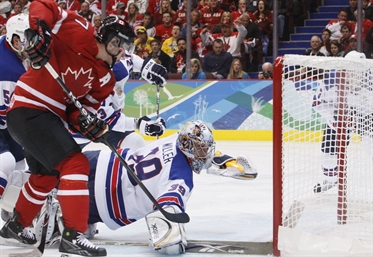Redemption and revenge
Redemption and revenge
From Miller to Nedved, Sochi offers second chances

 In Sochi, will U.S. goalie Ryan Miller avenge the disappointment of losing the 2010 gold medal game to Canada in overtime? Photo: Jukka Rautio / HHOF-IIHF Images
In Sochi, will U.S. goalie Ryan Miller avenge the disappointment of losing the 2010 gold medal game to Canada in overtime? Photo: Jukka Rautio / HHOF-IIHF Images
For these unfortunate souls, Sochi represents a chance for redemption or revenge – a happy ending, whichever way you look at it. Here’s IIHF.com’s list of 10 personalities who could really use a gold medal on February 23 at the Bolshoy Ice Dome.
Zinetula Bilyaletdinov
Russia’s head coach has a chance to take revenge for the nightmare he endured at the 1980 Olympics in Lake Placid. Bilyaletdinov, then a 24-year-old Dynamo Moscow defenceman, made a critical mistake at the end of the first period of the famous 4-3 “Miracle on Ice” loss to the United States. He and defence partner Vasili Pervukhin stood still after goalie Vladislav Tretiak kicked out a long rebound.
“Everybody thought the period was over,” Bilyaletdinov told Wayne Coffey, author of The Boys of Winter, which revisits the Americans’ 1980 run. “We were all watching the clock. It was just a few seconds left. With so little time, you don’t think anything can happen.”
That error enabled American forward Mark Johnson to scoot into the Soviet zone and beat Tretiak for the 2-2 equalizer with one second left in the period. The Americans would win 4-3, and they captured the gold medal with a 4-2 victory over Finland, while Bilyaletdinov and his teammates settled for silver. In 2008, the IIHF named the “Miracle on Ice” the top international hockey story of the century.
While Bilyaletdinov claimed Olympic gold in Sarajevo in 1984, his only way to truly atone for losing to the Americans on U.S. ice is to win on Russian home ice 34 years later. If that includes an elimination-round win over the U.S, so much the better.
Continue readingPetr Nedved
The 42-year-old Czech forward has one of the strangest potential redemption stories imaginable. Nedved will play in his second Olympics 20 years after his debut in Lillehammer, Norway. In 1994, with Canadian citizenship, the Liberec native wore the red Maple Leaf as Canada marched to a gold medal clash with Sweden.
With the score tied 2-2 after regulation and overtime, the teams went to a heart-stopping shootout. In the sudden-death phase, Sweden’s Magnus Svensson failed to beat goalie Corey Hirsch. Nedved was then chosen to shoot on Tommy Salo. But his backhand deke with Salo down just trickled wide.
“When I went to shovel the puck in, it just got too far ahead of me and I couldn't reach it,” said Nedved. “I had the win on my stick.”
So Canada’s Olympic gold medal drought dating back to 1952 did not end thanks to a Czech-born and trained player. After Peter Forsberg scored his famous one-handed goal and Salo foiled Paul Kariya, the Swedes celebrated their first Olympic title instead.
A surprise 2014 selection by Czech coach Alois Hadamczik, Nedved now has one last shot at changing his storyline, defying the odds to become an Olympic champion.
Ryan Miller
Have you ever gone to the dentist for a root canal with no anaesthetic? If so, you might have an idea of how painful losing the 2010 Olympic final was for Ryan Miller.
When Canada’s Sidney Crosby scored the 3-2 winner at 7:40 of overtime, sending Canada Hockey Place and the entire host nation into a frenzy, the American netminder was devastated. Miller, 29, had done everything he could, posting a 94.6 save percentage and 1.35 GAA. He was named tournament MVP and Best Goalie, and also cracked the Olympic all-star team.
But when reporters asked him for post-game reaction, Miller was curt. “I feel like [expletive deleted],” the Buffalo Sabres veteran said before walking away from the microphone.
Leading the Americans to gold in Sochi – even if he winds up splitting time with Los Angeles Kings starter Jonathan Quick – would be the easiest way to feel a lot better.
Kimmo Timonen and Sami Salo
When some men near the age of 40, they go through a midlife crisis, acquiring sports cars and trophy wives. But for Finnish defencemen Kimmo Timonen (38) and Sami Salo (39), an Olympic gold medal would be the supreme prize after all the disappointments they’ve endured.
Timonen and Salo are both members of what has unofficially been dubbed the “Quadruple Silver Club.” Along with fellow Finns Toni Lydman and Jarkko Ruutu, they’re the only players who have lost an Olympic final, Stanley Cup final, IIHF World Championship final, and World Cup of Hockey final.
Smart, hard-working, and likable, these two veterans will have many people throughout the hockey world pulling for them to leave Sochi with Finland’s first-ever Olympic hockey gold.
Olli Jokinen
What is Olli Jokinen’s most memorable moment in international hockey? Some might point to him setting up Niklas Hagman for Finland’s 2-1 overtime winner against Russia at the 1998 World Juniors in Helsinki, or scoring two third-period goals as Finland rallied for a 5-3 bronze medal victory over Slovakia at the 2010 Olympics.
Unfortunately for the 35-year-old Winnipeg Jets centre, what many remember most is his failure to beat Swedish goalie Henrik Lundqvist on a golden opportunity in the last minute of the 2006 Olympic final in Turin.
“It happened so quick,” said Jokinen afterwards. “I tried to go high and it basically hit [Lundqvist’s] stick. He robbed me. If I would have had the time over there, I would have scored for sure.”
Coach Erkka Westerlund will ask the big Kuopio native to play an important role, just as he did eight years ago, and with some luck, Sochi could become Jokinen’s defining moment.
Jay Bouwmeester
The NHL’s reigning ironman was too young to play on Canada’s gold medal team in Salt Lake City, and wasn’t selected for the triumphant 2010 squad either. Bouwmeester, a two-time World Champion (2003, 2004), made his Olympic debut in Turin, and 2006 was an ill-fated run for Canada.
The tall, fleet-footed Edmonton-born defenceman didn’t just endure the heartache of Canada’s being dethroned in a 2-0 quarter-final loss to Russia. He was on the ice as a penalty-killer, standing in front of Martin Brodeur’s net, when Alexander Ovechkin scored the eventual winner 35 seconds into Todd Bertuzzi’s interference minor early in the second period.
Like Jokinen, Bouwmeester had to wait more than 700 NHL games before making his playoff debut. The St. Louis veteran would love to prove the Hockey Canada braintrust did the right thing with his selection by shining in Sochi.
Rick Nash
The New York Rangers power forward has served Canada well over the years. Highlights of his five stints with the national team include Olympic gold (2010) and World Championship gold (2007).
But even though Nash was named tournament MVP with the 2007 team that went undefeated in Moscow, his gaffe in the next World Championship final enabled the Russians to spoil a once-in-a-century opportunity for Canada.
Quebec City hosted the final in 2008, which marked the IIHF’s 100th anniversary. Canada led Russia 4-2 going into the third period, but Alexei Tereshenko and Ilya Kovalchuk brought Russia even before the final buzzer. In overtime, Nash inadvertently shot the puck over the glass in his own zone, giving the Russians a power play. Kovalchuk’s laser shot at 2:42 earned Russia its first world title since 1993.
Indisputably, Nash wouldn’t mind breaking up the biggest winter sports party in Russian history.
Jaroslav Halak
In Vancouver, Slovakia posted its best-ever Olympic performance, finishing fourth. Much of that was s a credit to starting goalie Jaroslav Halak, who had a 91.1 save percentage and 2.41 GAA.
However, Halak would love to have a do-over of the third period of the bronze medal game against Finland. He allowed three goals on the 11 shots he faced in a 5-3 loss. “Too bad only one period screwed it up for us, but that's hockey,” he said later.
Can the 28-year-old Bratislava native find redemption by leading the Slovaks to their first Olympic hockey medal in Sochi?
Alexander Yeryomenko
Out of all the players discussed here, the 32-year-old Russian goalie from the KHL’s Dynamo Moscow is probably the biggest dark horse for redemption. After all, odds are good he won’t even enter the crease as Semyon Varlamov of the Colorado Avalanche and Sergei Bobrovsky of the Columbus Blue Jackets take care of business.
But you never know. A combination of injuries and erratic play forced the Czechs to use all three of their goalies in Turin in 2006, for example. And Yeryomenko would undoubtedly like a chance to help people forget the miscue he made on Mikko Koivu’s 2-1 overtime winner for Finland in the 2007 semi-final in Moscow.
Yeryomenko tried to pokecheck the Minnesota Wild forward but missed, enabling Koivu to put the puck in the gaping cage. It was the first time Russia had ever lost a World Championship game on Moscow ice, dating back to 1957.
What a beautiful feeling it would be for Yeryomenko to share in a Russian march to Sochi gold, even if it only means playing a period or two.
Back to Overview











































